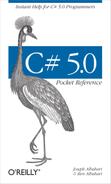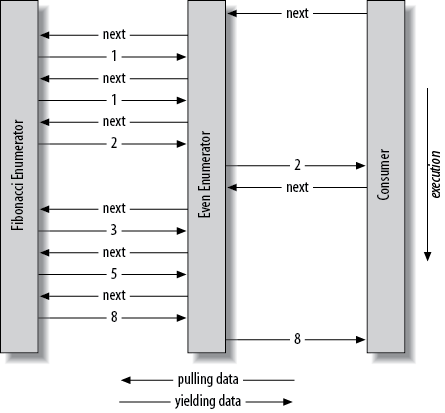An enumerator is a read-only,
forward-only cursor over a sequence of values; it is an
object that implements System.Collections.IEnumerator or System.Collections.Generic.IEnumerator<T>.
The foreach statement
iterates over an enumerable object. An enumerable
object is the logical representation of a sequence. It is not itself a
cursor, but an object that produces cursors over itself. An enumerable
either implements IEnumerable/IEnumerable<T> or has a method named GetEnumerator
that returns an enumerator.
The enumeration pattern is as follows:
classEnumerator// Typically implements IEnumerator<T> { publicIteratorVariableTypeCurrent { get {...} } public bool MoveNext() {...} } classEnumerable// Typically implements IEnumerable<T> { publicEnumeratorGetEnumerator() {...} }
Here is the high-level way to iterate through the characters in
the word beer using a foreach statement:
foreach (char c in "beer") Console.WriteLine (c);
Here is the low-level way to iterate through the characters in
beer without using a foreach statement:
using (var enumerator = "beer".GetEnumerator()) while (enumerator.MoveNext()) { var element = enumerator.Current; Console.WriteLine (element); }
If the enumerator implements IDisposable, the foreach statement also acts as a using statement, implicitly disposing the
enumerator object.
You can instantiate and populate an enumerable object in a single step. For example:
using System.Collections.Generic;
...
List<int> list = new List<int> {1, 2, 3};The compiler translates the last line into the following:
List<int> list = new List<int>(); list.Add (1); list.Add (2); list.Add (3);
This requires that the enumerable object implements the System.Collections.IEnumerable
interface, and that it has an Add
method that has the appropriate number of parameters for the
call.
Whereas a foreach statement is
a consumer of an enumerator, an iterator is a
producer of an enumerator. In this example, we use
an iterator to return a sequence of Fibonacci numbers (where each number
is the sum of the previous two):
using System;
using System.Collections.Generic;
class Test
{
static void Main()
{
foreach (int fib in Fibs(6))
Console.Write (fib + " ");
}
static IEnumerable<int> Fibs(int fibCount)
{
for (int i = 0, prevFib = 1, curFib = 1;
i < fibCount;
i++)
{
yield return prevFib;
int newFib = prevFib+curFib;
prevFib = curFib;
curFib = newFib;
}
}
}
OUTPUT: 1 1 2 3 5 8Whereas a return statement
expresses, “Here’s the value you asked me to return from this method,” a
yield return statement expresses,
“Here’s the next element you asked me to yield from this enumerator.” On
each yield statement, control is
returned to the caller, but the callee’s state is maintained so that the
method can continue executing as soon as the caller enumerates the next
element. The lifetime of this state is bound to the enumerator, such
that the state can be released when the caller has finished
enumerating.
Note
The compiler converts iterator methods into private classes
that implement IEnumerable<T>
and/or IEnumerator<T>. The
logic within the iterator block is “inverted” and spliced into the
MoveNext method and the Current property on the compiler-written
enumerator class, which effectively becomes a state machine. This
means that when you call an iterator method, all you’re doing is
instantiating the compiler-written class; none of your code actually
runs! Your code runs only when you start enumerating over the
resultant sequence, typically with a foreach statement.
An iterator is a method, property, or indexer that contains
one or more yield statements. An
iterator must return one of the following four interfaces (otherwise,
the compiler will generate an error):
System.Collections.IEnumerable System.Collections.IEnumerator System.Collections.Generic.IEnumerable<T> System.Collections.Generic.IEnumerator<T>
Iterators that return an enumerator interface
tend to be used less often. They’re useful when writing a custom
collection class: typically, you name the iterator GetEnumerator and have your class implement
IEnumerable<T>.
Iterators that return an enumerable interface
are more common, and simpler to use because you don’t have to write a
collection class. The compiler, behind the scenes, writes a private
class implementing IEnumerable<T> (as well as IEnumerator<T>).
An iterator can include multiple yield statements:
static void Main()
{
foreach (string s in Foo())
Console.Write (s + " "); // One Two Three
}
static IEnumerable<string> Foo()
{
yield return "One";
yield return "Two";
yield return "Three";
}Iterators are highly composable. We can extend our Fibonacci example by adding the following method to the class:
static IEnumerable<int> EvenNumbersOnly (
IEnumerable<int> sequence)
{
foreach (int x in sequence)
if ((x % 2) == 0)
yield return x;
}
}We can then output even Fibonacci numbers as follows:
foreach (int fib in EvenNumbersOnly (Fibs (6))) Console.Write (fib + " "); // 2 8
Each element is not calculated until the last moment—when
requested by a MoveNext() operation.
Figure 1-5 shows the data requests
and data output over time.
The composability of the iterator pattern is essential in building LINQ queries.

